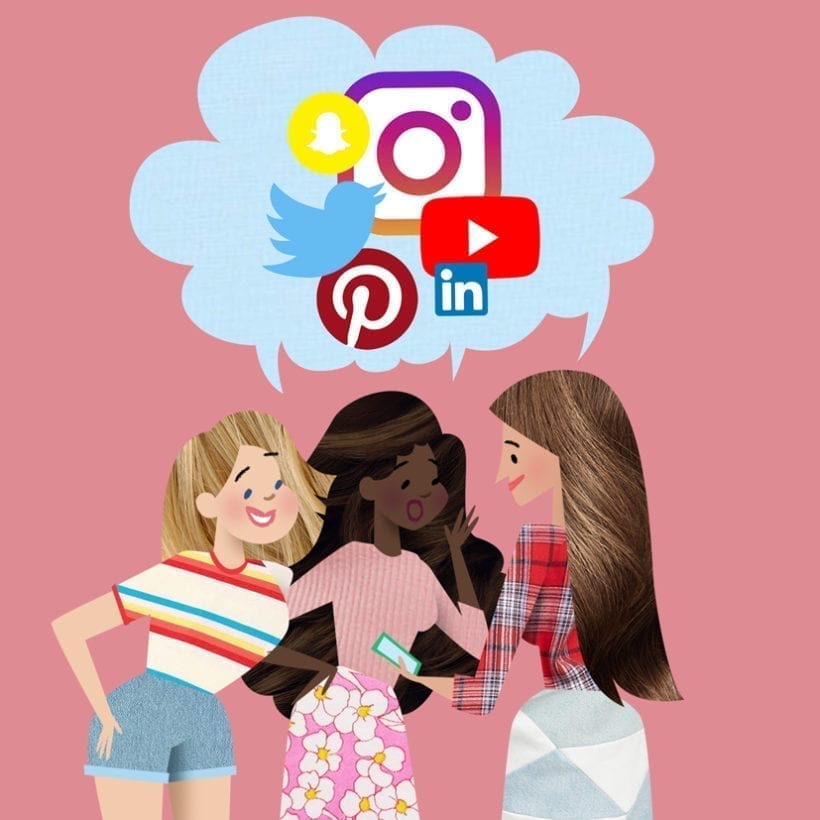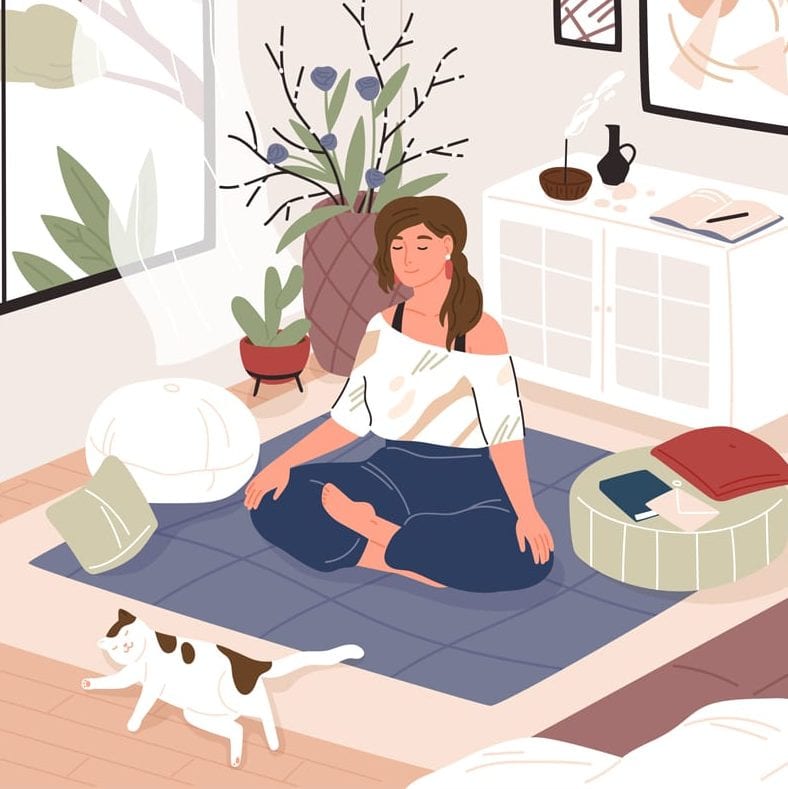Social media: You either love it or hate it. And, either way, you are probably still on it. It is hard to ignore the increasing impact social media has on our lives from the way we shop to what we eat, and even how we think of ourselves. From a health standpoint, social media can be a mecca of information on diet, nutrition and disease awareness. But the increase of knowledge and information, combined with the stress, mindlessness and lack of sleep due to blue light caused by our devices, can also have a more negative effect on our health — including our gut.
“Social media can contribute to poor sleep hygiene as many of us either finish the day or start the day with looking at social media in bed,” says Alissia Zenhausern, N.M.D., a naturopathic physician at NMD Wellness of Scottsdale. “The artificial light emitted from our phones as we lay in bed can prevent our body’s natural release of melatonin. Without the proper release of melatonin, we often experience difficulty falling or staying asleep,” she adds.
If we have poor gut health, or excess stress, we throw off our gut balance and ultimately our melatonin.
So, what does all this have to do with our gut health? A lot. “Not only does the artificial light from our phones affect our sleep but our brain is deeply connected to our nervous system and gut, specifically the vagus nerve [which] connects a network of important nerves in the gut to different regions of the brain — this means that there is a 24/7 communication between our gut and our brain,” says Zenhausern. “In the gut, tryptophan is a precursor that is converted to melatonin, the hormone regulating the sleep-wake cycle. If we have poor gut health or excess stress, we throw off our gut balance and ultimately our melatonin,” she adds.
In addition to the disruption between the brain-gut connection, Peyton Berookim, M.D., F.A.C.G., a double board-certified gastroenterologist in Los Angeles, says that “lack of sleep can disrupt [the] body’s normal hormone regulation.” And, a spike in cortisol (aka, the stress hormone) can have a lasting impact on the gut. “With regards to gut health, elevated cortisol levels can cause upset stomach, change in bowel habits and increased stomach acid which causes heartburn/reflux,” he notes. “This plays on the “brain-gut connection, which demonstrates how what our brains process has a downstream effect on how our guts function,” he adds.
And while the blue light emitting from our phones is one thing, the direct impact of social media on the gut spans beyond keeping us awake at night. According to Zenhausern, “the constant stream of information can lead to chronic stress which in turn can affect our digestive health.”
But the stress is not the only thing impacting our gut health. In fact, Zenhausern believes that our collective habit of mindlessly scrolling through feeds can also tamper with gut health. “Social media is often a way to pass time when we are alone. How many times have you seen people scrolling through their Instagram while they are eating lunch? The problem with mindlessly scrolling through social media when eating is you are not being mindful about eating and can eat too quickly and often don’t take time to chew your food,” says Zenhausern. “Taking your time to be mindful while you eat can make a huge difference [to] your digestive health and allow your body to better absorb key nutrients from your diet,” she adds. “Being mindful while you eat is so important because it allows your body to have the time to release the hormones needed to let you know when you are full — this alone can prevent you from overeating. When we eat too quickly, like when we mindlessly scroll through social media, we don’t give our body enough time to release signals to our brain to tell us we are full.”
If that was not enough, Zenhausern and Berookim both agree that the simple act of looking at a food-centered social media account can also impact the gut and appetite. “Normally, ghrelin [the hunger hormone] is produced in the stomach and tells our brain we are hungry. It sends a signal to a region of the brain that controls the amount of food we eat,” says Zenhausern. “If we see a photo of delicious food, like that on social media, it can cause an increase in the release of ghrelin into our bloodstream, leading to a spike in our appetite.” Berookim adds that the act of staring at a #foodstagram “ignites a number of processes, including increased saliva production, increased stomach acid and intestinal peristalsis (constriction and relaxation of muscles of the intestinal wall).” This process can be felt as “discomfort and cause stomach rumbling” not to mention a bigger potential for craving-induced food choices, which — let’s face it — are not always the healthiest or best option for optimal gut health.
Zenhausern also notes that the constant self-comparison might cause added stress — and could even lead to poor diet choices that impact gut health — especially in women. “Macquarie University and the University of New South Wales both researched the relationship between time spent on Instagram and body image,” remarks Dr. Zenhausern. “The study examined [276] Australian and American women [and] revealed that even 30 minutes on social media can ‘make women fixate negatively on their weight and appearance,’ according to ‘The New York Post.’ Additionally, the participants displayed dissatisfaction about their own bodies after looking at ‘fitspo’ images and idolized celebrities,” she adds.
The combined stress of social media can have a direct effect on our moods, but that change in mood (and boost in cortisol) can tap into the gut and wreak havoc. “With much of our neurotransmitters, including serotonin, being produced in our gut, it makes sense that when we feel stressed, we experience an increase in GI [gastrointestinal] symptoms like abdominal discomfort, diarrhea or constipation or nausea,” Zenhausern explains. “Our gut and brain have many signaling pathways which allow them to communicate [and] is why controlling stress is so important,” she adds. “Stress can also interfere with your gut bacteria from communicating with one another throwing off their natural ecosystem.”
How to Reduce the Impact of Social Media on the Gut
Spend less time on social media: It can likely improve your overall health, both mentally and physically, since keeping the constant comparisons and negative feelings to a minimum might reduce some of the stress that comes along with it.
Do not eat with your phone in sight: Putting your phone on airplane mode during a meal — yes, even when you are alone — might help create more mindful eating habits. Instead of scrolling endlessly, focusing on each delicious, mouth-watering bite can activate your body’s digestion receptors and allow you to eat until satisfied, not accidentally overeat. And, if you are sharing a meal with someone, putting your phone away is a great excuse to indulge in your personal relationships. Looking up from your screen at the person across from you can help you establish that human contact that many of us crave in our tech-savvy world and might also boost serotonin levels and leave you feeling happy, uplifted and confident.
Curate your feed to things that lift your spirits and inspire you.
Reduce comparison stress: If you find that the people you follow — especially those that create that comparison stress — might be leading to the negative impact on your gut and health, simply unfollow them or mute their account. Curating your feed to things that lift your spirits and inspire you rather than get you down and force you to think negatively about yourself can have a profound impact on your relationship with social media (and yourself!).
Go inward and try a breathing technique: When the stress does get to you, do not panic. Instead, take a moment to recognize why you feel stressed. Is it guilt over your current diet plan after seeing a model post her secrets to a slim body? Are you feeling left out by friends and therefore experiencing negative emotions that might lead to discomfort in the gut? Acknowledge your reasons for stress and then put your phone down and take a few moments to ground and go inward. You can do so by closing your eyes and focusing on your breath via breathing techniques like box breathing, which helps reduce stress. To box breathe, simply inhale slowly for four counts, then hold for four counts, and exhale for four counts. Before taking another inhale, allow yourself to take a moment (four counts) without inhaling or exhaling to just be. Practicing a few rounds of this might help wash away some feelings of stress and get you back to yourself.
Create a balance: Like diet and exercise, social media is something we can all afford to be more mindful of. After all, posting on Instagram in the wee hours of the night (or scrolling through your #fitspo feed) is not healthy, just like indulging in an ice cream cake or forgetting to add vegetables to your plate is not healthy. By creating more balance with your social media usage, you can create an overall more happy, confident and healthier you.
We only recommend products we have independently researched, tested, and loved. If you purchase a product found through our links, Sunday Edit may earn an affiliate commission.







